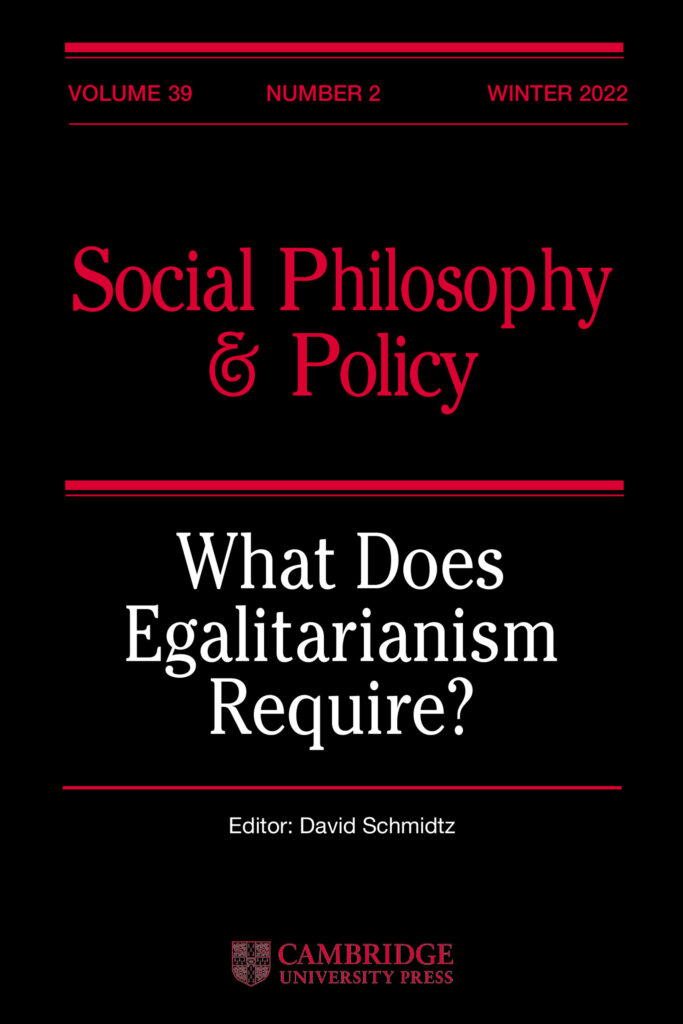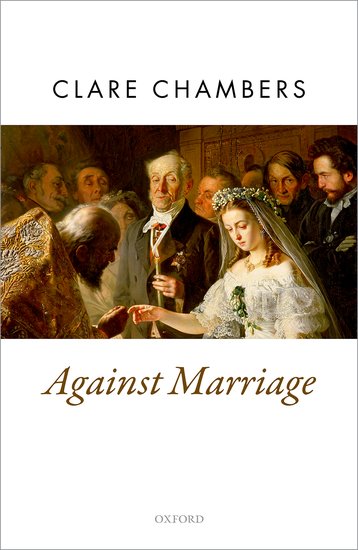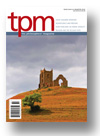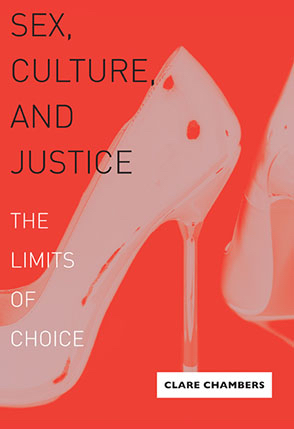liberalism
- all posts on feminism, all posts on liberalism, all posts on social construction, feminism, liberalism
“Making Inequality Visible Without Making it Worse”
“Making Inequality Visible Without Making it Worse” is published in Social Philosophy & Policy (Vol. 39 No. 2, 2022). You can read it here.
Abstract: Egalitarian commitments have often been thought compatible with practices that are later identified as inegalitarian. Thus, a fundamental task of egalitarianism is to make inequality visible. Making inequality visible requires including marginalized people, questioning what equality requires, and naming inequality. At the same time, egalitarianism is a movement for change: egalitarians want to make things more equal. When egalitarians seek change at the institutional level, the two egalitarian tasks are complementary: making inequality visible is part of campaigning to make things better. However, at the level of social norms there is a dilemma because making inequality visible can make things worse. Making inequality visible can reinforce unequal norms and fail to address intersectionality. The case of gendered pronouns illustrates this dilemma.
- all posts on feminism, all posts on liberalism, all posts on the body and beauty, articles, feminism, liberalism, the body
Sex, Money, and Luck in Sport

Clare Chambers, “Sex, Money, and Luck in Sport” published in Journal of Medical Ethics Vol. 46 No. 9 (2020). You can read the paper here.
- all posts on culture and religion, all posts on feminism, all posts on liberalism, articles, feminism, liberalism, multiculturalism and religion
Respect, Religion, and Feminism
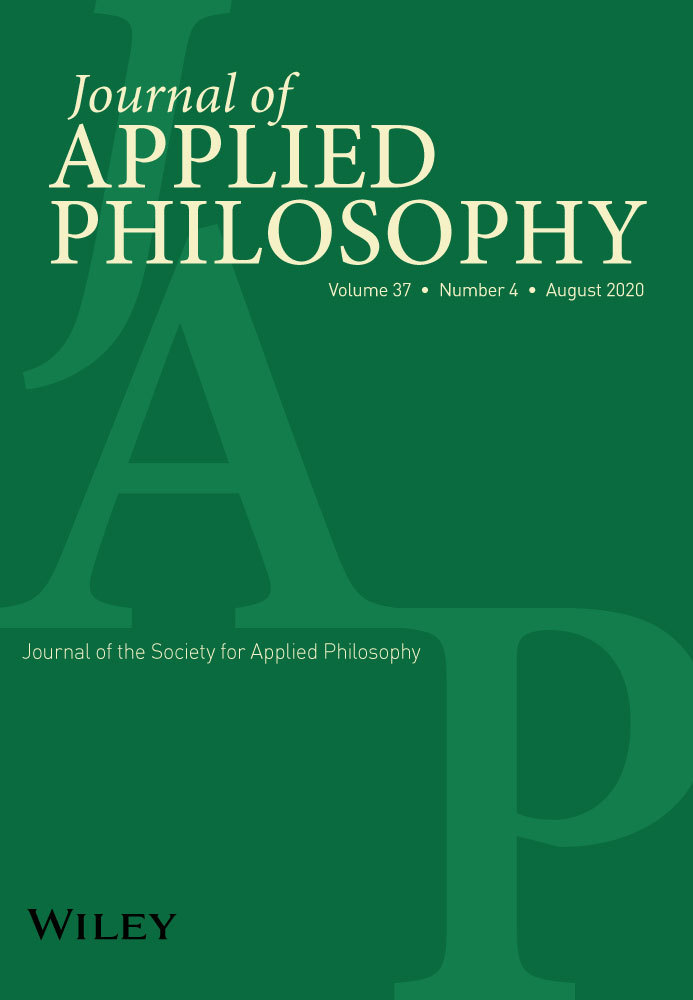
Respect, Religion, and Feminism: Comments on Lori Watson and Christie Hartley, Equal Citizenship and Public Reason: A Feminist Political Liberalism is published in Journal of Applied Philosophy September 2020. You can read the paper here.
Abstract: There is significant disagreement among feminists and liberals about the compatibility between the two doctrines. Political liberalism has come under particular criticism from feminists, who argue that its restricted form of equality is insufficient. In contrast, Lori Watson and Christie Hartley argue that political liberalism can and must be feminist. This article raises three areas of disagreement with Watson and Hartley’s incisive account of feminist political liberalism. First, it argues that an appeal to a comprehensive doctrine can be compatible with respecting others, if that appeal is to the value of equality. Second, it takes issue with Watson and Hartley’s defence of religious exemptions to equality law. Third, it argues that political liberalism can be compatible with feminism but that it is not itself adequately feminist. It concludes that political liberalism is not enough for feminists.
- Against Marriage, all posts on feminism, all posts on liberalism, all posts on marriage, feminism, liberalism, multiculturalism and religion, publications on marriage
Against Marriage: An Egalitarian Defence of the Marriage-Free State
Against Marriage was published by Oxford University Press in 2017, with a paperback in 2019. Read the book on Oxford Scholarship Online here.Winner of the APSA David Easton Award 2018.
Synopsis
Against Marriage is a radical argument for the abolition of state-recognised marriage. Clare Chambers argues that state-recognised marriage violates both equality and liberty, even when expanded to include same-sex couples. Instead Chambers proposes the marriage-free state: an egalitarian state in which religious or secular marriages are permitted but have no legal status.
Part I makes the case against marriage. Chambers investigates the critique of marriage that has developed within feminist and liberal theory. Feminists have long argued that marriage is a violation of equality since it is both sexist and heterosexist. Chambers endorses the feminist view and argues, in contrast to recent egalitarian pro-marriage movements, that same-sex marriage is not enough to make marriage equal. Chambers argues that state-recognised marriage is also problematic for liberalism, particularly political liberalism, since it imposes a controversial, hierarchical conception of the family that excludes many adults and children.
Part II sets out the case for the marriage-free state. Chambers critically assesses recent theories that attempt to make marriage egalitarian, either by replacing it with relationship contracts or by replacing it with alternative statuses such as civil union. She then sets out a new model for the legal regulation of personal relationships. In the marriage-free state regulation is based on relationship practices not relationship status, and these practices are regulated separately rather than as a bundle. The marriage-free state thus employs piecemeal, practice-based regulation. Finally, Chambers considers how the marriage-free state should respond to unequal religious marriage. The result is an inspiring egalitarian approach that fits the diversity of real relationships.
Reviews
“Clare Chambers has produced what will surely be for years to come the definitive argument for the abolitionist view of marriage. … [T]his is in my opinion a superb book. It is prodigiously scholarly, but at the same time wonderfully clear and accessible. The arguments are provocative and challenging throughout. The literature on this vitally important topic urgently needed a book-length defense of the abolitionist position. It is hard to imagine a book performing this necessary role better than Chambers’s Against Marriage.”
Ralph Wedgwood in Ethics
Against Marriage is “political philosophy at its most practical and readable.”
Andrew Harrop, General Secretary of the Fabian Society, in Fabian Review
“This is a distinct and important contribution to an increasingly crowded field of liberal political philosophy on marriage and the state and, perhaps most interestingly, to our understanding of the liberal project broadly. … Where other liberals seek more vigorously to balance competing demands of freedom and equality, or emphasize freedom, Chambers hews rigorously to an egalitarian position. You won’t find another book that does this so effectively or by way of such productive engagement with existing scholarship. Laying out the egalitarian case in such clear and compelling terms, Chambers highlights the challenges it presents to the liberal side of her liberal feminist equation. In so doing, Against Marriage leaves us wondering just how tenable the liberal feminist project is. … Chambers leads us to these questions by bringing us to the edge of the liberal feminist frontier. This alone would make Against Marriage a distinct and important contribution. But, of course, Chambers does more. She offers a compelling vision of why and how to move beyond marriage and points us in the direction of work that needs to be done. All with the grace and graciousness of an analytical philosopher running at full throttle.”
Tamara Metz in Political Theory
“Against Marriage makes an important contribution to the debate over the future of marriage within liberalism. It is clear and cogently argued and a pleasure to read. One of its virtues is its breadth; it makes arguments which address a range of liberal and feminist views and should be accessible to non-specialists. At the same time, it advances the leading edge of the specialist debate in provocative and intriguing ways.”
Elizabeth Brake in Mind
“Clare Chambers provides a clear, lucid and timely argument against state-recognized marriage based on the liberal principles of liberty and equality. … Throughout, she is masterful at anticipating and responding carefully to potential objections to her arguments and proposals. …. And her responses to those who might disagree with her proposals reveal a two-fold carefulness: as a philosopher, she is thoughtful, deliberate, precise, and meticulous; as a feminist, she is attentive, concerned, and compassionate — considering not only the philosophical justifications for her proposals but also their practical fall out for women and other vulnerable populations. … I highly recommend Chambers’ book as an important scholarly and pedagogical resource. It is beautifully crafted and makes an important contribution to the literature in liberal political theory and, more specifically, to the philosophical literature on marriage and family. … It was my distinct pleasure to read this book and be provoked by its arguments into a better understanding of both liberalism’s promise and its limitations with regard to its support of diverse forms of relationship.”
Shelley M. Park in Notre Dame Philosophical Reviews
“Chambers’ Against Marriage is a wonderful addition to a growing literature demanding that we think seriously about the institution of marriage and how it may have to be altered to meet the demands of justice and equity.”
Robert Scott Stewart in Metapsychology Online Reviews
- all posts on culture and religion, all posts on liberalism, all posts on the body and beauty, liberalism, multiculturalism and religion, the body
Reasonable Disagreement and the Neutralist Dilemma
 Chambers, Clare, “Reasonable Disagreement and the Neutralist Dilemma: Abortion and circumcision in Matthew Kramer’s Liberalism with Excellence” in The American Journal of Jurisprudence (May 2018).
Chambers, Clare, “Reasonable Disagreement and the Neutralist Dilemma: Abortion and circumcision in Matthew Kramer’s Liberalism with Excellence” in The American Journal of Jurisprudence (May 2018).You can read the paper here.
Abstract: This paper starts by investigating the idea of reasonable disagreement. It then considers Matthew Kramer’s argument that there is no neutral solution available to the disagreement over abortion. The paper argues that Kramer’s account has wider application, and identifies a neutralist dilemma. The neutralist dilemma applies when, of two policy options available to the state, one is unreasonable. It follows that the state should enact only the reasonable policy. However, in a neutralist dilemma the fact of reasonable disagreement due to the burdens of judgment means that it is not possible for the state to act at all, whether legislating or not, without deviating from neutrality. The paper develops the concept of the neutralist dilemma and then applies it to another case discussed by Kramer: infant circumcision. The paper argues that the debate over infant circumcision can be framed as a neutralist dilemma, but that the most plausible resolution of the dilemma results in an argument in favor of the legal prohibition of the practice. This is a surprising result, since most liberal states do not restrict circumcision and since prohibition of circumcision might initially appear to be non-neutral or even illiberal; however it is consistent with the tenets of neutralist liberalism.
-
Medicalised Genital Cutting and the Limits of Choice
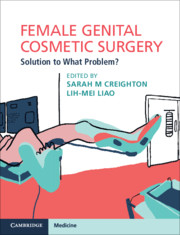 in Female Genital Cosmetic Surgery: Interdisciplinary Analysis and Solution, edited by Sarah Creighton and Lih-Mei Lao (Cambridge University Press, 2019).
in Female Genital Cosmetic Surgery: Interdisciplinary Analysis and Solution, edited by Sarah Creighton and Lih-Mei Lao (Cambridge University Press, 2019).In this chapter I challenge the idea that an appeal to choice exonerates Female Genital Cosmetic Surgery (FGCS). My argument proceeds in five stages. First, I consider the normative role that choice plays in liberal society and philosophy. Second, I note that UK law does not treat choice as adequate for accessing FGCS. Third, I consider the relationship between choice and the concept of normality. Fourth, I consider choice in the context of cosmetic surgery generally, and analyse the distinctive features of FGCS. Fifth, I consider the policy implications of my analysis.
You can find the book here.
-
Conscience and Context
In Political Emotions: Toward a Decent Public Sphere, edited by Thom Brooks (Palgrave MacMillan, forthcoming).
In The New Religious Intolerance Martha Nussbaum sets out an impassioned plea against that intolerance, which she sees as a pressing but almost entirely European problem. Although there are differences between European nations, Nussbaum argues, Europeans in general have a variety of problematic attitudes to religious diversity that are not found in the USA. These include “fear and mistrust,” inconsistency, “a concern for homogeneity that leads them to commit some errors in public argument that are troubling,” the desire that immigrants “fit in,” greater anti-Semitism than is found in the USA, and a refusal to debate, let alone embrace, “the free exercise of religion”. In place of this European foolishness “the American solution is urgently needed.” The New Religious Intolerance is thus at once a critique of the ‘European’ way of dealing with religion and a defence of the superior American way. Events since Nussbaum published NRI suggest that both Europeans and Americans have grounds for deep soul-searching and self-criticism concerning attitudes to immigration and diversity. In this paper I offer a critique not of the political implications of Nussbaum’s account, but rather of its philosophical underpinnings. My argument proceeds through analysis of her critique of a legal ban on the burqa which has been implemented in various ways in France, Belgium, and Italy
-
The Limitations of Contract: Regulating Personal Relationships in the Marriage-Free State
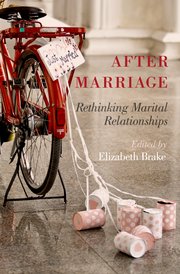 Many theorists defend relationship contracts. Some argue that enforceable relationship contracts should be available alongside existing or reformed state-recognised marriage, and available to either married or unmarried couples. Other theorists argue that relationship contracts are the best sort of legal regulation to replace marriage. It is this latter question that is the subject of this chapter. The chapter contrasts contract and directive models of regulation, and notes that contract appears more compatible with liberty than does directive. However this appearance is illusory since contracts can undermine liberty, directives can enhance liberty, and even a contract regime requires default directives. Moreover, there are various problems with the enforcement of relationship contracts. Specific performance is rarely appropriate in the relationship context. The alternative, fault-based compensatory alimony, risks causing injustice to vulnerable parties such as those who take on caring responsibilities (usually women) and children. Relational contract theory attempts to deal with some of these problems but has its own limitations. The chapter concludes that contract is not the best replacement for marriage.
Many theorists defend relationship contracts. Some argue that enforceable relationship contracts should be available alongside existing or reformed state-recognised marriage, and available to either married or unmarried couples. Other theorists argue that relationship contracts are the best sort of legal regulation to replace marriage. It is this latter question that is the subject of this chapter. The chapter contrasts contract and directive models of regulation, and notes that contract appears more compatible with liberty than does directive. However this appearance is illusory since contracts can undermine liberty, directives can enhance liberty, and even a contract regime requires default directives. Moreover, there are various problems with the enforcement of relationship contracts. Specific performance is rarely appropriate in the relationship context. The alternative, fault-based compensatory alimony, risks causing injustice to vulnerable parties such as those who take on caring responsibilities (usually women) and children. Relational contract theory attempts to deal with some of these problems but has its own limitations. The chapter concludes that contract is not the best replacement for marriage.Reviewers’ comments:
The book is “strenuously avant-garde”. The New York Times (5th April 2016).
Chambers’ chapter is “sobering and refreshing”. Notre Dame Philosophical Reviews (2nd May 2016).
Chambers, “one of the best-known advocates” of the claim that marriage should not be recognised by the state, contributes a “nuanced and lucid” chapter that is “among the most interesting contributions in the volume.” Hypatia (2017)
You can read more about the book here.
-
Feminism and Liberalism
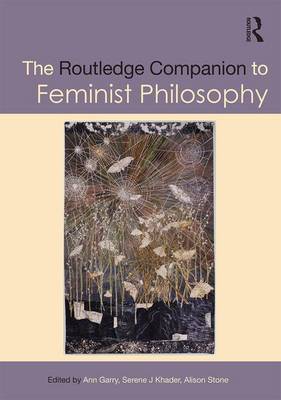 In Routledge Companion to Feminist Philosophy, edited by Serene Khader, Ann Gary, and Alison Stone (Routledge, 2017).
In Routledge Companion to Feminist Philosophy, edited by Serene Khader, Ann Gary, and Alison Stone (Routledge, 2017).For some feminists liberalism is little more than patriarchy in disguise; for others, it is the framework for securing justice. Feminism, like all other positions in political philosophy, is a range of views rather than a single determinate viewpoint. One aspect of this range is that feminism includes both academics and activists, for whom the term ‘liberalism’ can signify rather different things; after all, liberalism is not one single thing either.
In this chapter I start by considering feminist criticisms of liberalism. I discuss two aspects of feminist critique: first, academic feminist critiques of non-feminist liberal philosophy; second, activist feminist critiques of what is variously called “choice feminism”, “third-wave feminism”, or simply “liberal feminism”.
I then move to those feminists who endorse liberalism and argue that a suitably modified liberalism offers the best path to gender equality. This position, “feminist liberalism,” is mostly found in contemporary Anglo-American political philosophy. Feminist liberals understand liberalism as a commitment to substantive, demanding principles of justice based on freedom and equality. Included in this section are those feminist approaches that combine radical feminism’s insights about the limitations of individual choice with feminist liberalism’s commitment to autonomy, equality, and justice.
See more about the book here.
- all posts on culture and religion, all posts on liberalism, articles, liberalism, multiculturalism and religion, read
Liberal Views
- all posts on feminism, all posts on liberalism, all posts on marriage, chapters, feminism, liberalism, publications on marriage
“The Family as a Basic Institution”: A Feminist Analysis of the Basic Structure as Subject
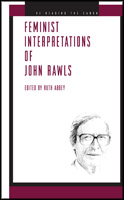 in Ruth Abbey (ed.), Feminist Interpretations of Rawls (Penn State Press, 2013).
in Ruth Abbey (ed.), Feminist Interpretations of Rawls (Penn State Press, 2013).In Section 50 of Justice as Fairness: A Restatement, titled “The Family as a Basic Institution”, John Rawls replies to Susan Moller Okin’s feminist critique of A Theory of Justice. The question of how Rawlsian justice might secure gender equality has been discussed by many feminists, most notably by Okin. However, as I argue in this chapter, the Rawls-Okin debate raises more questions than it answers. Okin criticises Rawls for failing to apply his theory adequately to the family: she criticises not Rawls’s approach in general, but his attitude to the family in particular. Okin argues that a consistent application of Rawlsian theory would secure gender justice, but that Rawls is remiss in refusing such consistency. In fact, as I show, Rawls’s remarks on the family reveal a more fundamental problem with Rawlsian theory than Okin allows. It is not that Rawls fails to apply his theory correctly to the family, but rather that the specific case of the family illustrates deep-seated difficulties with Rawlsian justice as a whole.
The problem, to give an outline, is that Rawls’s ambiguous remarks on the family are comprehensible only at the expense of his fundamental claim that there is something distinctive about the application of justice to the basic structure. Okin criticises Rawls for failing to make good on the fact that the family is part of the basic structure. If he did make good, Okin claims, he would see that the principles of justice must apply to the family in a much more extensive way than he actually allows. As I show, however, the family is one illustration of the fact that how the principles of justice apply to an institution does not depend on whether that institution is part of the basic structure. This is a problem for Rawls because the distinctiveness of the basic structure is a crucial part of the political liberalism which, by the end of his work, has become essential to the Rawlsian project.
In this chapter I first outline Okin’s critique of Rawls in more detail, and provide a valid formalisation of her argument against Rawls. I then examine the main premises of her argument and look for evidence to support Okin’s interpretation of Rawls. I conclude that Okin’s interpretation is flawed but nonetheless highlights problems with Rawls’s claim that the basic structure is the subject of justice. I then consider and reject the argument that Rawls’s theory is consistent according to what I call the “whole structure view”: that the principles of justice apply to the basic structure considered as a whole. Finally, I consider G.A. Cohen’s argument that the basic structure distinction is problematic. I agree with Cohen’s criticism of the distinction, but suggest that Cohen is wrong in situating the problem with the issue of coercion. I conclude that Rawls’s position on justice in the family is at odds with his claim that the basic structure is uniquely the subject of justice.
You can see more about the book here.
- all posts on culture and religion, all posts on feminism, all posts on liberalism, chapters, feminism, liberalism
What kind of dialogue do we need? Gender, deliberative democracy and comprehensive values
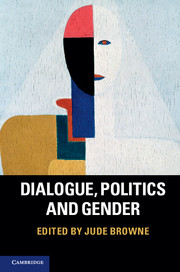 (with Phil Parvin) in Jude Browne (ed.) Dialogue, Politics and Gender (Cambridge University Press, 2013).
(with Phil Parvin) in Jude Browne (ed.) Dialogue, Politics and Gender (Cambridge University Press, 2013).This paper claims that a focus on gender as a source of controversy, and on feminism as a theoretical and practical approach, prompts a rethinking of the role of dialogue away from the liberal constitutionalist focus of deliberative democracy and towards a more fluid, reflexive approach.
-
Each outcome is another opportunity
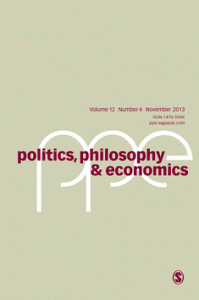 Politics, Philosophy and Economics (PPE) Vol. 8 No. 4 (2009).
Politics, Philosophy and Economics (PPE) Vol. 8 No. 4 (2009).This paper introduces the concept of a Moment of Equal Opportunity (MEO): a point in an individual’s life at which equal opportunity must be applied and after which it need not. The concept of equal opportunity takes many forms, and not all employ an MEO. However, the more egalitarian a theory of equal opportunity is, the more likely it is to use an MEO. The paper discusses various theories of equal opportunity and argues that those that employ an MEO are problematic. Unjust inequalities, those that motivate the use of equal opportunity, occur throughout peoples’ lives and thus go unrectified after an MEO. However, it is not possible to abandon the MEO approach and apply more egalitarian versions of equal opportunity throughout a person’s life since doing so entails problems of epistemology, efficiency, incentives and counter-intuitive results. The paper thus argues that liberal egalitarian theories of equality of opportunity are inconsistent if they support an MEO and unrealisable if they do not.
You can read this paper here.
-
Coercive redistribution and public agreement: re-evaluating the libertarian challenge of charity
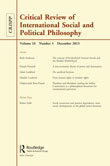 (with Phil Parvin) in Matt Matravers and Lukas Meyer (eds.), Democracy, Equality, and Justice (Routledge and special issue of Critical Review of International Social and Political Philosophy (CRISPP) Vol. 13 No. 1 (2010).
(with Phil Parvin) in Matt Matravers and Lukas Meyer (eds.), Democracy, Equality, and Justice (Routledge and special issue of Critical Review of International Social and Political Philosophy (CRISPP) Vol. 13 No. 1 (2010).
In this article, we evaluate the capacity of liberal egalitarianism to rebut what we call the libertarian challenge of charity. This challenge states that coercive redistributive taxation is neither needed nor justified, since those who endorse redistribution can give charitably, and those who do not endorse redistribution cannot justifiably be coerced. We argue that contemporary developments in liberal political thought render liberalism more vulnerable to this libertarian challenge.
Many liberals have, in recent years, sought to recast liberalism such that it is more hospitable to cultural, religious, and ethnic diversity. This move has resulted in increased support for the claim that liberalism should be understood as a political rather than comprehensive doctrine, and that liberal institutions should draw their legitimacy from agreements made among members of an appropriately conceived deliberative community, rather than from controversial liberal principles like individual autonomy. We argue that, while this move may indeed make liberalism more compatible with cultural diversity, it also makes it more vulnerable to the libertarian challenge of charity. Not all versions of liberalism are troubled by the challenge, but those that are troubled by it are increasingly dominant.
We also discuss G.A. Cohen’s claim that liberal equality requires an ‘egalitarian ethos’ and argue that, if Cohen is right, it is difficult to see how there can be an adequate response to the libertarian challenge of charity. In general, our argument can be summarised as follows: the more that liberalism is concerned accurately to model the actual democratic wishes and motivations of the people it governs, the less it is able to justify coercively imposing redistributive principles of justice.
You can read a copy of this paper here.
- all posts on culture and religion, all posts on feminism, all posts on liberalism, all posts on social construction, all posts on the body and beauty, beauty, feminism, liberalism, multiculturalism and religion, Sex, Culture, and Justice, social construction, the body
Sex, Culture, and Justice: The Limits of Choice
Sex, Culture, and Justice: The Limits of Choice was published in hardback and paperback by Penn State University Press in 2008. An e-book is also available. You can buy all versions here.
Autonomy is fundamental to liberalism. But autonomous individuals often choose to do things that harm themselves or undermine their equality. In particular, women often choose to participate in practices of sexual inequality-cosmetic surgery, gendered patterns of work and childcare, makeup, restrictive clothing, or the sexual subordination required by membership in certain religious groups. In this book, Clare Chambers argues that this predicament poses a fundamental challenge to many existing liberal and multicultural theories that dominate contemporary political philosophy. Chambers argues that a theory of justice cannot ignore the influence of culture and the role it plays in shaping choices. If cultures shape choices, it is problematic to use those choices as the measure of the justice of the culture. Drawing upon feminist critiques of gender inequality and poststructuralist theories of social construction, she argues that we should accept some of the multicultural claims about the importance of culture in shaping our actions and identities, but that we should reach the opposite normative conclusion to that of multiculturalists and many liberals. Rather than using the idea of social construction to justify cultural respect or protection, we should use it to ground a critical stance toward cultural norms. The book presents radical proposals for state action to promote sexual and cultural justice.
Amazon UK: http://www.amazon.co.uk/Sex-Culture-Justice-Limits-ebook/dp/B001UE6M1G/
Amazon US: http://www.amazon.com/Sex-Culture-Justice-Limits-ebook/dp/B001UE6M1G/
Reviews
“[A]n interesting, important, wide-ranging and well-argued book that contains a controversial proposal that will, no doubt, be widely debated.”
—Times Higher Education“[A]n important book. … Very few first-rate analytical thinkers … engage with social theorists: Chambers is a notable exception, and if only for that reason, her contribution should serve as a model for any endeavour of this kind. … Moreover, its strength lies not merely in the author’s mastery of two disparate intellectual traditions, but also in its cogent and provocative defence of a number of proposals.“
—Philosophy“[E]xtremely successful. … Testament to her scholarly rigour, Chambers skilfully avoids alienating either side of the academic divide [between analytical and continental philosophy]; achieving her stated aim, she undermines the foundations upon which such divides are rooted. … This opportune and tightly argued work reveals the extent to which equality and justice cannot be guaranteed by a political liberalism which venerates autonomy to the exclusion of other important values. Setting itself apart from other work in its field, this book forms, albeit on its own terms, part of the solution.”
—Feminist Theory“Chambers’ work makes a highly valuable contribution to contemporary philosophical debates. … Chambers’ work represents a great advance in attempting to forge a path between two positions which are so often considered to be diametrically opposed. The project … is a vital one. … [T]he value of the theoretical contribution, both to liberal and feminist philosophy, is indisputable.”
—Res Publica“Her interwoven arguments … are complex, meticulous and inventive. … [T]here is real potential here for this book to alter mainstream liberal thinking.”
—Feminist Review“An incisive, well-written book with a sustained, original argument.”
—Ruth Abbey, University of Notre Dame“The book contributes significantly to the literature of liberalism, autonomy, and feminism.”
—Ann Cudd, University of Kansas“Chambers’ refreshing approach has the potential to expand the scope of conventional liberal theory by showing how liberals can (and should) directly meet the challenge of postmodern approaches and by demonstrating that feminist contributions are the well from which most innovations in liberalism are drawn.”
—Avigail Eisenberg, University of Victoria -
Torture as an evil: Response to Claudia Card
 Criminal Law and Philosophy Vol. 2 No. 1 (January 2008).
Criminal Law and Philosophy Vol. 2 No. 1 (January 2008).This article argues that, while Claudia Card is right to reject proffered excuses for torture, her strategy for demonstrating that torture is an evil and thus inexcusable is problematic. You can read the paper here.
- all posts on culture and religion, all posts on feminism, all posts on the body and beauty, articles, feminism, liberalism, multiculturalism and religion, the body
Autonomy and equality in cultural perspective: Response to Sawitri Saharso
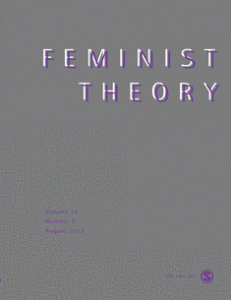 Feminist Theory Vol. 5 No. 3 (December 2004).
Feminist Theory Vol. 5 No. 3 (December 2004).This paper criticises Sawitri Saharso’s argument that hymen repair surgery and sex-selective abortion can be both multiculturalist and feminist policies.
You can read the paper here.
- all posts on culture and religion, all posts on liberalism, articles, liberalism, multiculturalism and religion
Nation-building, Neutrality and Ethnocultural Justice: Kymlicka’s ‘Liberal Pluralism’
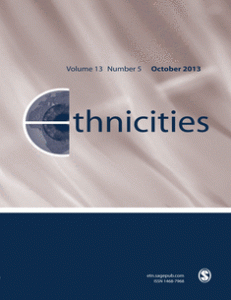 Ethnicities Vol. 3 No. 3 (September 2003).
Ethnicities Vol. 3 No. 3 (September 2003).This paper takes issue with Will Kymlicka’s arguments on ethnocultural justice. It argues that liberal nation-building is not the same thing as minority nation-building, and that the former need not cause injustice to minority ethnocultural groups.
You can read the paper here.
- all posts on culture and religion, all posts on liberalism, chapters, liberalism, multiculturalism and religion
All must have prizes: the liberal case for intervention in cultural practices
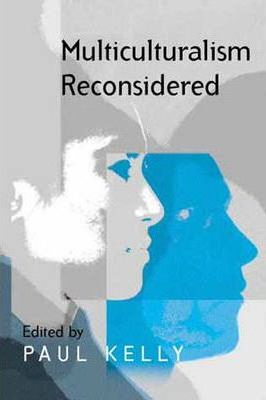 Paul Kelly (ed.) Multiculturalism Reconsidered: Culture and Equality and its Critics (Polity Press, 2002).
Paul Kelly (ed.) Multiculturalism Reconsidered: Culture and Equality and its Critics (Polity Press, 2002).This paper highlights a rare aspect of Brian Barry’s Culture and Equality that is not liberal enough: his assertion that unequal outcomes are unproblematic if they have been chosen. The paper argues instead that an ‘equality tribunal’ should be empowered to rule against certain forms of discrimination within groups.
